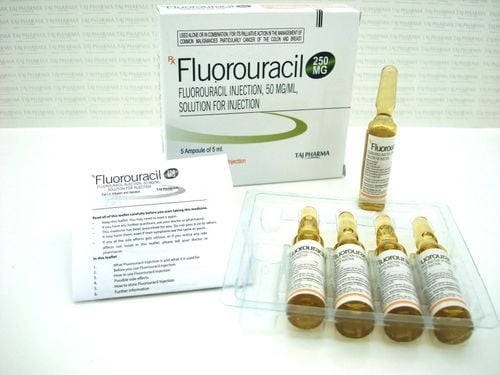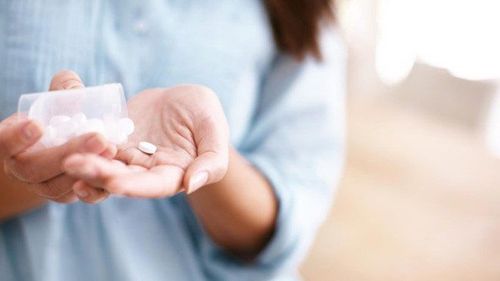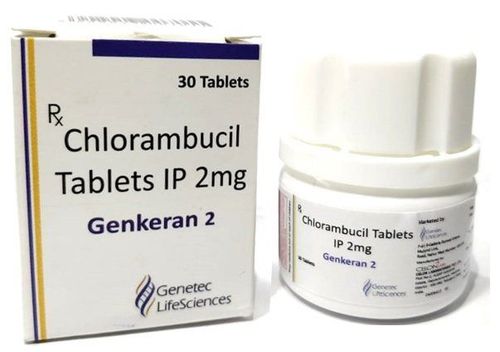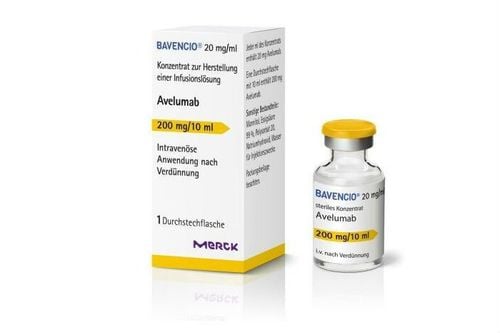This is an automatically translated article.
Idarubicin is used in combination for the treatment of acute myeloid leukemia in adults and acute lymphoblastic leukemia in children or advanced breast cancer. The drug belongs to the anthracycline group of anti-cancer drugs, effective in the treatment of cancers of the hematopoietic system and solid organ cancers.1. What does Idarubicin do?
Idarubicin is used in combination with other drugs in the treatment of acute myeloid leukemia in adults and in the treatment of acute lymphoblastic leukemia in children, and advanced breast cancer after chemotherapy failure. treatment (excluding anthracyclines).2. Contraindications Idarubicin
As recommended, the drug is contraindicated as follows:Hypersensitivity to Idarubicin or other anthracycline or anthracenediones. Congestive heart failure, liver failure, severe kidney failure. Uncontrolled infection. Severe cardiomyopathy, recent myocardial infarction, severe arrhythmia Persistent myelosuppression Ever-treated with the maximum cumulative dose of idarubicin hydrochloride and/or other anthracyclines and anthracenediones. Pregnant and lactating women
3. How to take Idarubicin
Mix idarubicin vials 5mg, 10mg, 20mg corresponding to 0.9% sodium chloride injection solution 5ml, 10ml, 20ml, slow intravenous infusion from 10-15 minutes. Do not mix with bacteriostatic solvents and should choose a site with a large vein and use a butterfly needle during infusion.4. Dosage of Idarubicin
Idarubicin is used in the following doses:Children with leukemia: 10-12 mg/m2 body area, 1 time/day, for 3 days, repeated every 3 weeks. Children with solid tumors: 5 mg/m2 body area, 1 time/day, used for 3 days, repeated use every 3 weeks. Adults: 12 mg/m2/day, for 3 days, by slow intravenous injection (10-15 minutes) in combination with cytosin arabinoside. Drug cytosin arabinoside 100 mg/m2/day infusion continuously for 7 days or with the first dose of 25 mg/m2 injected in full dose followed by a continuous infusion of 200 mg/m2/day for 5 days. Adults orally: Acute non-lymphoid leukemia 30 mg/m2/day, for 3 days (monotherapy); or dose 15 - 30 mg/m2/day, for 3 days (combination therapy) Adults with advanced breast cancer: Oral 45 mg/m2/day for 1 day or 15 mg/m2/day for 3 consecutive days , repeat after 3-4 weeks (monotherapy). Patients with renal impairment: Serum creatinine concentration ≥ 2 mg/deciliter, dose reduced to 75% of the standard dose. Hepatic impairment: Bilirubin 1.5 - 5 mg/decilit or aspartate transaminase 60 - 180 units, reduce the dose by 1⁄2; If bilirubin > 5 mg/deciliter or aspartate transaminase > 180 units, the drug should not be used.
5. Be careful when using Idarubicin
During the use of the drug, it is necessary to check the function of the heart, liver, kidneys and general blood. The left ventricular ejection fraction is considered the earliest way to detect cardiomyopathy. Monitor uric acid levels and use allopurinol to avoid kidney complications.Idarubicin exiting the blood vessels can cause severe local tissue necrosis, accompanied by a burning, stinging sensation. Therefore, when there are signs of venous bulging, the infusion should be stopped and reinserted in another vein.
At the bulging vein, ice should be applied immediately for 30 - 60 minutes continuously, then every 15 minutes for the first day. Applying ice will help limit the toxicity of the drug from spreading. Absolutely do not apply heat and use sodium bicarbonate because it can cause local tissue damage.
6. Idarubicin side effects
Some side effects may occur when taking the drug such as:Common: Headache, fever, convulsions, hair loss, erythema, urticaria, mucositis, nausea, vomiting, diarrhea, stomatitis, red urine, bleeding, anemia, bone marrow suppression, leukopenia (lowest: 8 - 29 days), extravasation necrosis, peripheral neuropathy, infection.
Uncommon: Arrhythmia, ECG changes, cardiomyopathy, congestive heart failure, myocardial toxicity, acute arrhythmia, hyperuricemia, hyperbilirubinemia, severe renal dysfunction, enteritis - heavy colon.
In addition, some drug interactions may occur such as:
Increases the risk of myelosuppression when leukemic therapy is combined with other drugs Increases cardiotoxicity in people treated with cytotoxic drugs Heart Several drugs that interact with anthracyclines have been studied, such as vinca alkaloids (cross-resistance), amphotericin B (increasing drug absorption) and cyclosporin and streptomicin (decreased drug clearance and increased toxicity). Do not take idarubicin with fluorouracil, etoposide, dexamethasone, heparin, hydrocortisone, methotrexate, vincristine. Above is important information about the drug Idarubicin. If you have any further questions, you should directly talk to your doctor for in-depth advice.
Please dial HOTLINE for more information or register for an appointment HERE. Download MyVinmec app to make appointments faster and to manage your bookings easily.













